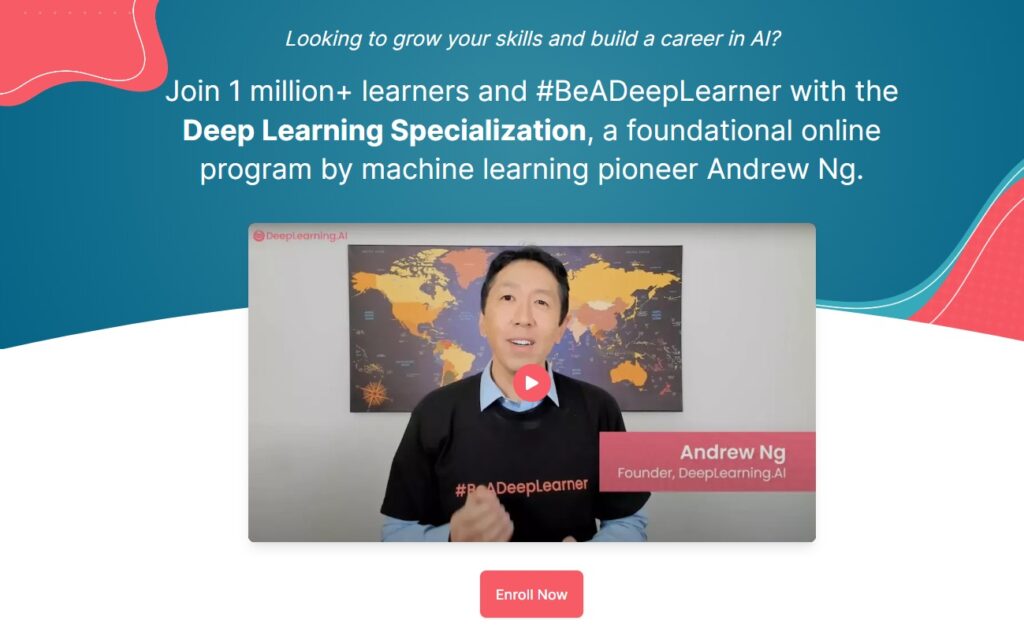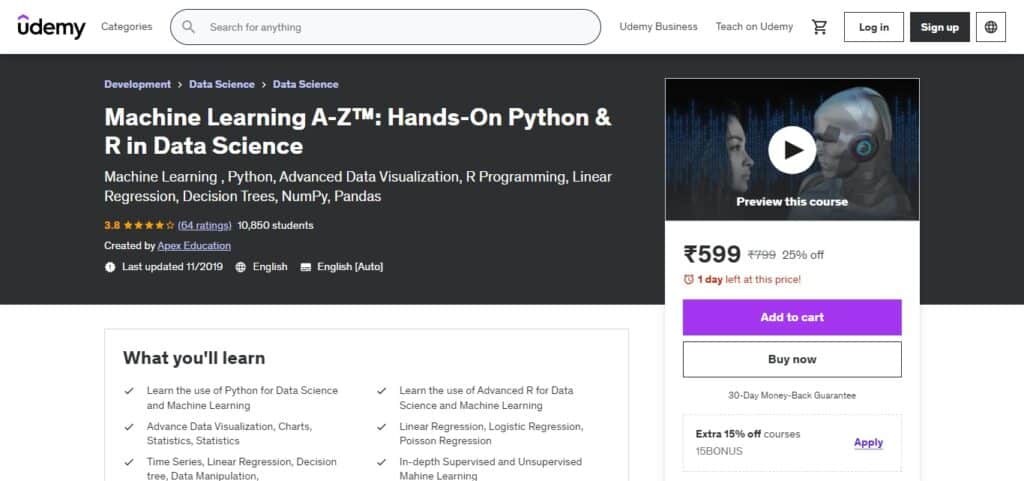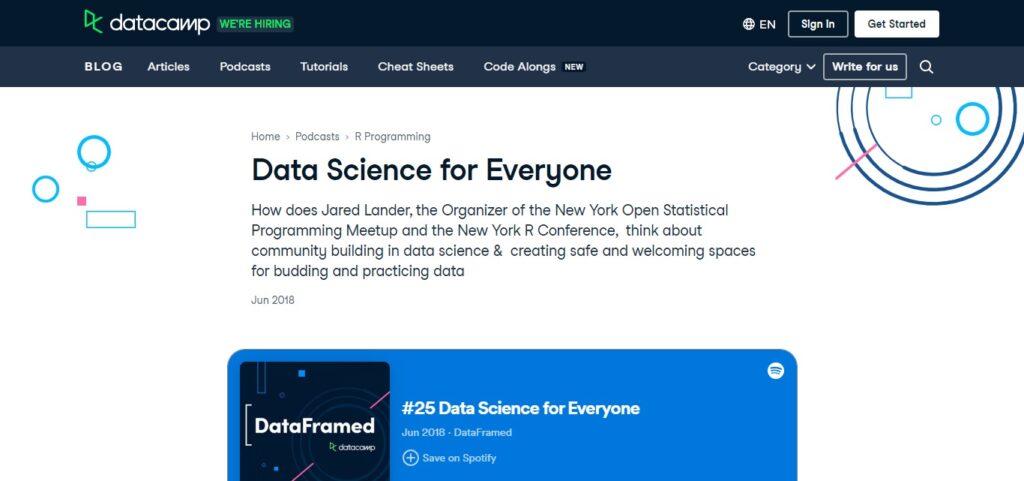Best Data Science Courses to Take In 2024 are Choosing the appropriate data science courses in 2023 will be essential to staying on the cutting edge of this quickly developing sector. Think about taking introductory statistics, Python, or R programming courses, as well as courses on data manipulation. Sites such as Coursera, edX, and Udacity provide extensive courses taught by leading academics and business professionals. Advanced topics will be better understood through specialized courses in big data technology, artificial intelligence, and machine learning. Enroll in courses that cover topics related to upcoming developments, such as responsible AI, federated learning, and quantum computing, to stay informed.
To apply academic knowledge to real-world circumstances, you must gain practical experience through projects or case studies. To guarantee a comprehensive grasp of the ethical issues in data science, look into courses that concentrate on data ethics, privacy, and security. These courses include networking options, like forums and community conversations, which can help you build professional relationships in the data science field and collaborate with others.
Why Choose Best Data Science Courses to Take In 2024?
Increasing Need for Data Experts: Because more and more firms are making decisions based on data, there is a growing need for qualified data scientists and analysts.
Various Career Paths: Applications for data science can be found in a wide range of sectors, including technology, healthcare, finance, and more. A thorough course can give you transferable abilities that you can use in a variety of industries.
- Advertisement -
Constant Progress in Technology: Since data science is a dynamic discipline, new tools, technologies, and methods are always being developed. Studying current courses guarantees that you pick up on the newest techniques and innovations in the industry.
Practical Experience in the Hands: Practical experience is essential for resolving issues in the real world, and top-notch data science courses frequently incorporate practical projects and real-world applications.
Opportunities for Networking: Credible data science courses frequently offer chances for networking with educators, industry experts, and other students. Maintaining connections within the sector and advancing one’s career both benefit from networking.
Maintain Your Edge in the Employment Market: Maintaining current skills is essential to being competitive in the job market, especially as demand for data professionals rises. You can stay ahead of the curve by taking the best courses.
Here Is List of The Best Data Science Courses to Take In 2024
- Data science ethics
- Data Visualization
- Machine Learning
- Data processing using Python
- Data science
- Business intelligence
- Data Scientist
- Excel
- Statistics
- Almabetter Data Science Course
- edX
- CCP Data Engineer certification
- Data wrangling
- IBM Data Science
- Coursera
- DataCamp – Python Programmer Track
- Deep Learning Specialization
- Statistics and Data Science MicroMasters Program (edX)
- Machine Learning A-Z™: Hands-On Python & R In Data Science (Udemy)
- Practical Deep Learning for Coders (fast.ai)
- Bayesian Methods for Machine Learning (Coursera)
- Data Science and Machine Learning Bootcamp with SQL (Udemy)
- Data Science and Machine Learning Bootcamp with Tableau (Udemy)
- Big Data Specialization (Coursera)
- University of Michigan – Applied Data Science with Python Specialization (Coursera)
- Data Science for Everyone (DataCamp)
- Data Science and Machine Learning Bootcamp with MATLAB (Udemy)
- Natural Language Processing in Python (DataCamp)
- Feature Engineering for Machine Learning (Udemy)
- Data Science and Machine Learning Bootcamp with Power BI (Udemy)
30 Best Data Science Courses to Take In 2024
1.Data science ethics
In the broad subject of Data science ethics, knowledge and insights are extracted from both structured and unstructured data using a combination of computational, statistical, and mathematical methods. Fundamentally, data science includes all phases of the data lifecycle, such as gathering, organizing, analyzing, and interpreting data. This area makes use of cutting-edge algorithms and machine learning models to find trends, patterns, and important data that can guide decision-making in a variety of businesses.
To manage enormous Data science ethics and extract valuable insights, Data science ethics need specialized tools and frameworks in addition to computer languages like Python or R. Data science has many uses, including predictive analytics, business intelligence, healthcare, finance, and other fields. The need for qualified data scientists is growing as more and more businesses realize the value of making decisions based on data, making data science an important and dynamic area in today’s technology environment.
2.Data Visualization
Data visualization will still be extremely important in the field of data science in 2024. Effective insight communication is becoming more and more important as data volume and complexity continue to rise. Better decision-making and communication inside businesses are made possible by data visualization, which is essential in converting complex datasets into visually appealing and easily understood representations. In 2024, data science workers should think about taking specialist courses in data visualization to stay up to date with the changing field.
These courses frequently discuss methods and tools for conveying compelling stories with data, handling representation and interpretation issues, and producing visually striking visualizations. A data scientist’s capacity to communicate discoveries is improved by proficiency in data visualization, which also promotes a deeper comprehension of the underlying patterns in the data. Gaining proficiency in data visualization is a skill set that can greatly increase the impact and efficacy of data-driven insights in the rapidly developing field of data science.
3.Machine Learning
As of 2024, the fields of data science and machine learning are still developing quickly, and experts in these fields must keep up with the most recent developments. A number of state-of-the-art courses are strongly advised for individuals who want to improve their abilities and maintain their competitiveness in the field. “Advanced Machine Learning Techniques” provides a thorough examination of cutting-edge algorithms, empowering professionals to take on challenging issues and come up with creative solutions. With its exploration of neural networks and their uses, “Deep Learning Architectures and Applications” offers practical expertise with deep learning frameworks.
“Data Engineering and Analytics” covers the entire process of gathering, cleansing, and analyzing data, highlighting the significance of effective data pipelines, for a thorough understanding of data science. Furthermore, “Ethics in AI and Responsible Data Science” promotes ethical and accountable practices in the field by addressing the ethical issues surrounding machine learning applications. These courses equip professionals with the knowledge and abilities necessary to navigate and actively contribute to the rapidly evolving field of machine learning and data science in 2024, as the technological landscape continues to change.
4.Data Processing using Python
As of 2024, the fields of data science and machine learning are still developing quickly, and experts in these fields must keep up with the most recent developments. A number of state-of-the-art courses are strongly advised for individuals who want to improve their abilities and maintain their competitiveness in the field. “Advanced Machine Learning Techniques” provides a thorough examination of cutting-edge algorithms, empowering professionals to take on challenging issues and come up with creative solutions. With its exploration of neural networks and their uses, “Deep Learning Architectures and Applications” offers readers a practical introduction to deep learning frameworks.
“Data Engineering and Analytics” covers the entire process of gathering, cleansing, and analyzing data, highlighting the significance of effective data pipelines, for a thorough understanding of data science. Furthermore, “Ethics in AI and Responsible Data Science” promotes ethical and accountable practices in the field by addressing the ethical issues surrounding machine learning applications. These courses equip professionals with the knowledge and abilities necessary to navigate and actively contribute to the rapidly evolving field of machine learning and data science in 2024, as the technological landscape continues to change.
5.Data Science
In order to extract valuable insights and knowledge from both organized and unstructured data, data scientists use a variety of scientific techniques, procedures, algorithms, and systems. Fundamentally, data science combines computer science, statistics, and mathematics to analyze and comprehend large, complicated datasets. The field uses a variety of methods to find patterns, trends, and correlations in data, such as statistical analysis, machine learning, data mining, and predictive modeling.

Data scientists are essential in helping firms make wise decisions and obtain a competitive edge by sifting through enormous volumes of data to find important information. In a typical data science pipeline, data is gathered, cleaned, and preprocessed. Advanced analytics techniques are then applied, and exploratory data analysis is conducted. Data science keeps developing as a result of growing access to large data and technological breakthroughs, propelling innovation and change in a number of sectors, including marketing, finance, healthcare, and more.
6.Business intelligence
The term “business intelligence” (BI) describes how technology, procedures, and instruments are used to gather, examine, and display business data so that it can be used to support well-informed decisions made inside an organization. Business Intelligence (BI) utilizes information from multiple sources, such as internal databases, external sources, and historical data, to offer significant insights into a company’s operations. Business intelligence’s main objective is to transform unprocessed data into usable knowledge so that managers, executives, and other stakeholders can make tactical and strategic choices that will improve operations and propel the company forward.
Online analytical processing (OLAP), data mining, data warehousing, dashboards, and other processes are all included in business intelligence (BI) and are used to create reports and visualizations that make complex data easier to understand. Organizations are realizing more and more how critical it is to use business intelligence in today’s cutthroat business environment in order to acquire a competitive edge, streamline operations, and quickly respond to shifts in the market.
7.Data Scientist
A proficient individual with expertise in extracting significant knowledge and insights from sizable and intricate databases is known as a data scientist. Data scientists use a range of tools and techniques, including machine learning algorithms, data mining, and statistical modeling, along with their skills in statistics, mathematics, and computer science, to find patterns, trends, and correlations in data. These experts are essential in converting unprocessed data into useful knowledge that enables businesses to make data-driven decisions.
Data scientists frequently focus on activities like feature engineering, data cleaning, and model validation. They are skilled in handling both organized and unstructured data. Effective communication skills are essential for data scientists in addition to technical proficiency, since they must clearly and understandably communicate their findings to non-technical stakeholders. The need for data-driven insights is increasing across industries, and data scientists play a critical role in fostering innovation, enhancing productivity, and resolving challenging business issues.
8.Excel
In 2024, selecting the top data science courses to advance one’s Excel proficiency will be essential to maintaining a competitive edge in the quickly developing data science industry. A few courses are particularly noteworthy for their thoroughness and relevance to real-world situations. The practical approach of “Data Analysis and Visualization with Excel” focuses on the sophisticated features of Excel for data manipulation, analysis, and visualization. The “Statistical Analysis with Excel” course explores regression analysis, hypothesis testing, and other statistical concepts using Excel tools for students looking for a deeper grasp of statistical approaches.
“Machine Learning in Excel” offers a great basis for incorporating predictive modeling into the well-known Excel environment, which is becoming increasingly important as machine learning gains traction. Furthermore, programs such as “Excel for Business Intelligence” provide a strong emphasis on how to integrate Excel with BI tools so that data analysis and strategic decision-making can flow together seamlessly. These courses guarantee that professionals can effectively leverage Excel’s potential to make educated decisions and propel success in a data-driven landscape, even as data science continues to advance.
9.Statistics
In today’s data-driven world, statistics is essential because it offers a methodical, scientific approach to gathering, analyzing, interpreting, presenting, and organizing data. Statistical techniques provide an effective way to make sense of vast and complicated datasets and come to well-informed decisions in a variety of sectors, including business, science, economics, and social sciences. While inferential statistics allow researchers to draw conclusions and predictions about populations from sample data, descriptive statistics, such as measures of central tendency and dispersion, aid in the summarization and description of data.
The significance of statistics has only grown with the emergence of big data and technological developments, impacting fields like artificial intelligence and machine learning. Statistical literacy becomes a valuable ability for workers across varied disciplines as firms increasingly rely on data to drive decision-making processes. This helps to create robust and accurate insights that guide strategic choices in a quickly developing global landscape.
10.Almabetter Data Science Course
Almabetter still offers a data science course; it’s probably meant to give students the fundamental knowledge and abilities they need to succeed in this quickly developing field. Programming languages (such as Python and R), statistical analysis, machine learning techniques, data manipulation, and data visualization are all common subjects covered in effective data science courses. To guarantee that students are able to use their knowledge in real-world situations, practical, hands-on projects and real-world applications are frequently interwoven. Furthermore, lessons on commonly used industry tools and technologies are frequently included in courses.
11.edX
As the needs of the industry change, edX remains a top provider of online education in 2024, providing a wide range of outstanding data science courses. The “Data Science and Machine Learning Bootcamp with Python” offered by prestigious universities is one particularly noteworthy course that offers a thorough introduction to important ideas and real-world applications. This course, which is designed for both beginning and intermediate learners, gives students the fundamental knowledge and abilities to manipulate data, visualize it, and use Python machine learning algorithms.

“Advanced Machine Learning” is another noteworthy program that explores cutting-edge methods to keep professionals on the cutting edge of innovation. Furthermore, the “Data Science MicroMasters Program” is still a well-liked option because it covers a wide range of subjects like machine learning, data analysis, and statistical principles. These edX courses enable people to navigate the complicated field of data science, creating a greater grasp of the subject and improving employment chances in 2024 and beyond, as the demand for data-driven decision-making grows.
12.CCP Data Engineer certification
In 2024, there are a number of excellent data science courses that are advised for those who want to become certified CCP Data Engineers and improve their abilities. Because data science is a dynamic and ever-evolving discipline, it is imperative to stay up to date on the newest tools and techniques. The “Data Engineering Specialization” course, which Coursera offers in partnership with prestigious universities like Duke University and the University of California, San Diego, is one particularly noteworthy offering. Important topics including data modeling, ETL procedures, and data warehousing are covered in this extensive curriculum. The “Advanced Machine Learning Specialization” offered by Coursera, created by deep learning pioneer Andrew Ng, is another noteworthy choice.
Advanced machine learning methods are covered in this course, which is essential for data engineers working on innovative projects. Furthermore, the University of California, San Diego’s “Big Data Specialization,” which is accessible on websites like Coursera, offers a strong foundation in big data technologies like Hadoop and Spark, which are necessary for earning the CCP Data Engineer certification. Data engineers hoping to succeed in the quickly changing field of data science in 2024 will have a well-rounded skill set thanks to these courses, practical projects, and real-world applications.
13.Data wrangling
Data science is still a fast evolving discipline in 2024, so practitioners need to keep up with the newest methods and technologies. An essential component of every data scientist’s skill set is still data wrangling, which is the process of organizing, cleansing, and converting unprocessed data into a format that can be used. There are a few standout courses for mastering data wrangling in 2024. Coursera offers “Data Wrangling and Cleaning with Python” as one example of such a course. This practical course offers a thorough introduction to Python data cleaning methods with a focus on practical applications.
Furthermore, seasoned data scientists wishing to improve their abilities in feature engineering and data manipulation may take the Udacity course “Advanced Data Wrangling and Feature Engineering”. The “Data Wrangling and Exploration in R” course on DataCamp is a great option for anyone looking for a more hands-on learning environment. It covers the nuances of manipulating data using R programming. These courses provide aspiring and seasoned data scientists with essential insights and practical skills, helping them stay at the forefront of this dynamic sector in 2024, especially as the demand for skilled data wranglers develops.
14.IBM Data Science
In 2024, prospective data scientists who want to advance their knowledge and stay on the cutting edge of the quickly changing industry may think about registering for one of IBM’s best data science courses. Modern courses from IBM, a leader in technology and innovation worldwide, give students a thorough understanding of data science principles and techniques in a hands-on manner. A notable course is the “IBM Data Science Professional Certificate,” which uses well-known tools like Python and Jupyter notebooks to cover important subjects including machine learning, data analysis, and data visualization.
The “Advanced Data Science with IBM” course also explores more sophisticated methods, such as natural language processing and deep learning. In order to guarantee practical experience, these courses combine real-world initiatives with IBM’s data science expertise. Keeping up with IBM’s courses in 2024 will enable workers to take on challenging tasks and make significant contributions to the data science landscape as it continues to drive innovation and shape industries.
15.Coursera
Even in 2024, those looking for the best data science education still turn to Coursera. A variety of courses are available on Coursera to meet the requirement of staying up to date with the latest tools and approaches in the ever-evolving field of data science. The University of Michigan’s “Applied Data Science with Python Specialization” is one particularly noteworthy course. Using the Python programming language, this extensive curriculum covers all the essential components of data science, such as data processing, machine learning, and data visualization.

Another excellent choice is Stanford University’s “Machine Learning” course, which is essential for anyone delving deeply into the principles of machine learning. For anyone seeking to improve their proficiency in statistical analysis, Duke University’s “Statistics with R Specialization” is a great option. Because of its wide range of courses, students can customize their education to focus on particular data science topics. This makes Coursera an invaluable resource for both novice and experienced data scientists in 2024.
16.DataCamp – Python Programmer Track
As a top resource for refining data science abilities in 2024, especially with regard to Python programming, DataCamp stands out. The Python Programmer Track at DataCamp is an excellent option for anyone wishing to solidify their knowledge of Python, which is a language that is frequently utilized in the data science industry. Participants in the track will have an immersive learning experience as they work through basic Python principles, data manipulation, and analysis. “Introduction to Python” and “Intermediate Python,” two notable courses in this track, provide students with a strong foundation in programming.
With courses like “Intermediate Python for Data Science” and “Machine Learning for Time Series Data in Python,” aspiring data scientists may go further into specialist fields like machine learning and data visualization. DataCamp is the best option for anyone who want to improve their Python programming abilities in the context of data science because of its interactive, hands-on learning style and real-world applications. This will ensure that students are competent and relevant in the rapidly changing data science field in 2024.
17.Deep Learning Specialization
As the field of data science continues to advance quickly in 2024, individuals who want to succeed in their careers must stay abreast of technological developments. Offering a thorough and innovative curriculum, the Deep Learning Specialization stands out as one of the best data science courses to enroll in. This specialization explores the complexities of neural networks, convolutional networks, sequence models, and other advanced topics within deep learning. It was created by top specialists in the area. Students will develop a strong understanding of both the theoretical ideas and practical implementation components of deep learning thanks to the hands-on nature of the courses, practical assignments, and real-world applications.

Aside from improving one’s knowledge, finishing the Deep Learning Specialization gives one a competitive edge in the ever-changing data science market, particularly in light of the growing demand for individuals with experience in artificial intelligence and machine learning. With enterprises still discovering the benefits of deep learning, this specialty gives people the know-how to take on challenging issues and make valuable contributions to the data science community in 2024.
18.Statistics and Data Science MicroMasters Program (edX)
The edX MicroMasters Program in Statistics and Data Science is a thorough and demanding virtual education program that gives students superior knowledge and abilities in these fields. Designed by recognized academic institutions or organizations, this curriculum generally encompasses basic principles of probability, statistics, and data analysis, providing a strong basis for comprehending intricate data-driven issues. Frequently, participants work on practical projects and assignments that apply machine learning algorithms and statistical techniques to real-world situations. Incorporating programming languages such as R or Python improves students’ practical proficiency by allowing them to manipulate and analyze data effectively.

A capstone project typically serves as the program’s finale and enables students to apply their newly acquired knowledge and abilities in a real-world context. Through the completion of this MicroMasters Program, individuals can improve their employment chances in industries where data-driven decision-making is crucial by obtaining a relevant credential that indicates skill in statistical analysis and data science. This program is accessible to a global audience thanks to edX’s flexible online structure, which also fosters a varied community of learners who are passionate about developing their proficiency in statistics and data science.
19.Machine Learning A-Z™: Hands-On Python & R In Data Science (Udemy)
A thorough online course called “Machine Learning A-ZTM: Hands-On Python & R In Data Science” is available on Udemy and is a great starting point for anyone interested in learning more about machine learning. Using the Python and R programming languages, this course offers a practical and hands-on approach to understanding machine learning topics. It has been carefully crafted and is taught by specialists. The course is designed for students of all skill levels and covers a wide range of topics, from the foundations of machine learning to more complex methods like reinforcement learning and natural language processing.

Through projects and real-world applications, the course’s practicality is highlighted and students are able to use their newly acquired information in meaningful ways. With an emphasis on developing a solid foundation in both R and Python, participants acquire adaptable abilities useful in a range of data science contexts. The course is a great option for anyone looking to become an expert in machine learning and advance their skills in the quickly developing field of data science because of its intuitive format and captivating content.
20.Practical Deep Learning for Coders (fast.ai)
Fast.ai’s ground-breaking resource “Practical Deep Learning for Coders” enables programmers to explore the field of deep learning with firsthand, real-world expertise. This course, in contrast to conventional methods, uses a top-down teaching paradigm that puts practical applications ahead of theoretical ideas. It uses high-level APIs like PyTorch and offers an intuitive interface to demystify the intricacy of deep learning. Natural language processing, collaborative filtering, picture and text categorization, and many more subjects are covered in this course.
Its dedication to ensuring that everyone can access deep learning, regardless of background or level of experience, is what makes it unique. Through an emphasis on real-world application, the course helps students quickly understand the fundamental ideas and construct effective models. The focus on developing useful, deployable apps guarantees that participants acquire the skills necessary to apply deep learning to their own projects in addition to understanding the theory. “Practical Deep Learning for Coders” by Fast.ai is a must-have resource for anyone hoping to fully realize the promise of this game-changing technology since it challenges conventional wisdom in the deep learning space.
21.Bayesian Methods for Machine Learning (Coursera)
The “Bayesian Methods for Machine Learning” course on Coursera is a comprehensive and enlightening exploration into the world of Bayesian statistics as applied to machine learning. Developed to cater to both beginners and experienced practitioners, the course delves into the fundamentals of Bayesian thinking and probabilistic modeling. It covers a diverse range of topics, including Bayesian networks, Markov Chain Monte Carlo (MCMC) methods, and Bayesian deep learning. The emphasis on probabilistic reasoning and uncertainty quantification sets this course apart, offering a more nuanced understanding of machine learning models.
With a combination of theoretical insights and practical applications, learners gain the skills to implement Bayesian methods in real-world scenarios. The course benefits from clear explanations and engaging exercises, enabling participants to grasp the intricacies of Bayesian thinking and apply these techniques to enhance the robustness and interpretability of their machine learning models. Whether one is new to Bayesian concepts or seeking to deepen their understanding, this Coursera offering provides a valuable and accessible resource for mastering Bayesian methods in the context of machine learning.
22.Data Science and Machine Learning Bootcamp with SQL (Udemy)
The Data Science and Machine Learning Bootcamp with SQL on Udemy is a comprehensive and hands-on course designed to equip learners with the essential skills and knowledge needed in the rapidly evolving fields of data science and machine learning. Taught by industry experts, the bootcamp covers a wide range of topics, starting from the fundamentals of SQL for data manipulation and analysis. Participants gain a solid foundation in SQL queries, enabling them to extract valuable insights from databases. As the course progresses, it delves into the core principles of data science, including data cleaning, exploratory data analysis, and feature engineering.
The machine learning segment of the bootcamp is particularly robust, covering popular algorithms, model evaluation, and hyperparameter tuning. Practical applications and real-world projects are woven throughout the curriculum, providing learners with hands-on experience and the opportunity to apply their skills to solve actual problems. Whether you’re a beginner or an experienced professional, this bootcamp provides a structured and engaging learning experience to master the intricacies of data science, machine learning, and SQL. By the end of the course, participants are well-prepared to tackle complex data-driven challenges in various industries.
23.Data Science and Machine Learning Bootcamp with Tableau (Udemy)
The Data Science and Machine Learning Bootcamp with Tableau on Udemy is a dynamic and comprehensive course designed to empower participants with a dual skill set in data science and the powerful data visualization tool, Tableau. Led by seasoned instructors, the bootcamp begins by covering the foundational concepts of data science, including data manipulation, exploratory data analysis, and machine learning algorithms. A distinctive feature of this program is its integration of Tableau, a leading data visualization platform. As participants progress through the course, they learn how to leverage Tableau to create compelling visualizations that communicate complex insights derived from their data science analyses.
The hands-on approach ensures that learners not only understand the theoretical underpinnings of data science and machine learning but also gain practical expertise in presenting their findings through impactful visualizations. With a focus on real-world applications and projects, participants leave the bootcamp with a robust skill set that combines data science proficiency with the ability to communicate insights effectively using Tableau. Whether you are a novice or an experienced professional, this bootcamp provides a valuable blend of technical expertise and practical application in the exciting intersection of data science and data visualization with Tableau.
24.Big Data Specialization (Coursera)
The extensive and industry-relevant Big Data Specialization program available on Coursera is meant to give students the information and abilities they need to successfully traverse the complex world of big data analytics and technologies. This specialization includes a number of courses that explore many facets of big data, such as data management, storage, processing, and analysis. It was created in partnership with top professionals and educators. By gaining practical expertise with well-known frameworks and tools like Hadoop, Spark, and NoSQL databases, participants are better equipped to handle big data difficulties in the real world. The program provides a comprehensive grasp of the main elements of big data ecosystems by covering subjects including scalable data processing, machine learning, and data modeling.
Regardless of your background—developer, business analyst, or data professional—the Big Data Specialization enables you to fully utilize big data’s potential for creativity and well-informed decision-making. The specialization’s blend of theoretical knowledge and applied skills guarantees that students are ready to make a significant contribution to the quickly developing big data field. For individuals looking to progress their careers in the data-driven landscape, the Big Data Specialization on Coursera provides an invaluable educational experience with its interactive assignments, industry-relevant projects, and adaptable online learning platform.
25.University of Michigan – Applied Data Science with Python Specialization (Coursera)
The extensive and well-respected Applied Data Science with Python Specialization program offered by the University of Michigan on Coursera is created to give students the tools they need to succeed in a profession in data science. The five courses that make up this specialization cover important facets of machine learning, data analysis, and visualization with the Python programming language. The courses that are covered are “Introduction to Data Science in Python,” “Applied Plotting, Charting & Data Representation in Python,” “Applied Machine Learning in Python,” “Applied Text Mining in Python,” as well as “Applied Social Network Analysis in Python.”
These courses, taught by knowledgeable professors, provide students with a hands-on, practical experience through a series of assignments and projects that let them use what they’ve learned in real-world situations. This specialization offers an exciting and well-structured study route for data science professionals, regardless of experience level, to help you improve your skills. Participants will have mastered Python programming, data processing, visualization, and machine learning techniques by the end of the program, equipping them to take on the challenges of the quickly developing data science sector.
26.Data Science for Everyone (DataCamp)
Data Science for Everyone, offered by DataCamp, is a comprehensive and accessible online learning platform designed to demystify the complexities of data science for individuals of all backgrounds. This course breaks down the intricate world of data science into digestible modules, providing a step-by-step journey for beginners and those seeking to enhance their skills. DataCamp employs a hands-on approach, combining theoretical concepts with practical, real-world applications to ensure a well-rounded understanding of the subject.

The curriculum covers key areas such as data manipulation, statistical analysis, machine learning, and data visualization, enabling participants to gain proficiency in using popular programming languages like Python and R. With interactive exercises and projects, learners have the opportunity to apply their knowledge in a simulated environment, fostering a deeper comprehension of data science techniques. Data Science for Everyone stands out for its user-friendly interface, expert-led instruction, and a commitment to making the power of data science accessible to everyone, regardless of their prior experience in the field.
27.Data Science and Machine Learning Bootcamp with MATLAB (Udemy)
The Data Science and Machine Learning Bootcamp with MATLAB, available on Udemy, offers a comprehensive and practical learning experience for individuals eager to delve into the realms of data science and machine learning using MATLAB. This bootcamp is structured to cater to both beginners and those with some programming background, providing a well-rounded curriculum that covers foundational concepts as well as advanced techniques.
Participants engage in hands-on projects, gaining proficiency in data manipulation, statistical analysis, and the implementation of machine learning algorithms using MATLAB’s powerful toolkit. The course is led by experienced instructors who guide learners through real-world applications, enabling them to develop a deep understanding of the practical aspects of data science and machine learning. With a focus on MATLAB, participants benefit from a unique perspective on solving complex problems, making this bootcamp a valuable resource for individuals looking to harness the capabilities of MATLAB in the context of data science and machine learning.
28.Natural Language Processing in Python (DataCamp)
DataCamp’s Natural Language Processing (NLP) in Python course is a comprehensive and hands-on learning experience designed for individuals interested in unlocking the power of language data. This course delves into the fascinating field of NLP, guiding learners through the fundamental concepts and techniques needed to analyze and understand human language using Python. With a focus on practical applications, participants gain proficiency in text processing, sentiment analysis, and language modeling.
The curriculum also covers the use of popular NLP libraries such as NLTK and spaCy, providing learners with the tools to efficiently process and analyze textual data. Through interactive exercises and real-world examples, participants develop the skills to extract valuable insights from text data, making this course invaluable for those looking to leverage NLP in their data science or machine learning projects. With DataCamp’s user-friendly platform and expert-led instruction, the Natural Language Processing in Python course makes the complexities of NLP accessible to learners of all levels, from beginners to seasoned professionals.
29.Feature Engineering for Machine Learning (Udemy)
The Feature Engineering for Machine Learning course on Udemy is a comprehensive and practical resource tailored for individuals seeking a deep understanding of the crucial role that feature engineering plays in enhancing machine learning models. This course goes beyond the basics, providing a detailed exploration of techniques to transform raw data into informative features that significantly impact model performance. Participants learn to preprocess and engineer features effectively, addressing challenges such as missing data, outliers, and categorical variables.
The curriculum covers a variety of feature engineering methods, including scaling, encoding, and creating interaction terms, allowing learners to extract meaningful patterns from diverse datasets. With hands-on exercises and real-world examples, this course equips participants with the skills needed to optimize their machine learning models for better predictive accuracy. The instructor guides learners through the entire feature engineering process, emphasizing the importance of this often-overlooked aspect of machine learning. Whether you are a beginner or an experienced practitioner, this course provides valuable insights into transforming raw data into features that drive the success of machine learning algorithms.
30.Data Science and Machine Learning Bootcamp with Power BI (Udemy)
The Data Science and Machine Learning Bootcamp with Power BI on Udemy is an engaging and comprehensive course designed to empower participants with the skills needed to harness the synergy between data science, machine learning, and Power BI. This bootcamp offers a practical and hands-on approach, catering to both beginners and those with some background in data analysis. Participants gain proficiency in utilizing Power BI as a powerful tool for visualizing and interpreting data, while also exploring the integration of machine learning techniques into their analytics workflows.
The curriculum covers key concepts such as data cleaning, feature engineering, and building machine learning models, emphasizing the practical implementation of these techniques using Power BI. Through a series of real-world projects and exercises, learners have the opportunity to apply their knowledge, making the course a valuable resource for professionals looking to enhance their data analytics and machine learning skills within the context of Power BI. The instructor guides participants through each step, ensuring a thorough understanding of how to leverage these technologies synergistically for effective data-driven decision-making.
Conclusion Best Data Science Courses to Take In 2024
In summary, the field of data science education has changed in 2024 to meet the industry’s increasing expectations, thus it is critical for prospective professionals to select programs that not only offer a strong foundation but also keep up with the most recent developments. The top data science courses in 2024 will be those that give students the tools they need to solve problems in the real world by fusing in-depth theoretical knowledge with practical experience. Artificial intelligence, deep learning, and machine learning are just a few of the cutting-edge techniques and technologies that are frequently included in these courses to ensure that graduates are ready for the always changing nature of the industry.
In addition, since data science is holistic in today’s interconnected world, courses emphasizing ethical considerations, teamwork, and communication are essential. The greatest data science courses in 2024 will ultimately be those that enable students to adjust to the unavoidable developments that will reshape the field as well as manage the data landscape of today.
FAQ Best Data Science Courses to Take In 2024
What are the key considerations when choosing a data science course in 2024?
Consider factors such as course content, relevance to current industry trends, the reputation of the institution or platform offering the course, and the availability of hands-on projects and real-world applications.
Which institutions offer the best data science courses in 2024?
Top institutions include universities like Stanford, MIT, and UC Berkeley, as well as online platforms like Coursera, edX, and DataCamp. Popular programs from these platforms are often taught by industry experts and professors from leading universities.
What programming languages are essential for data science courses in 2024?
Python and R remain crucial for data science. Look for courses that cover these languages extensively, along with relevant libraries and frameworks such as TensorFlow, PyTorch, and scikit-learn.
Are there specialized courses for specific areas within data science?
Yes, many courses offer specializations in machine learning, natural language processing, computer vision, and other specific domains. Specialized courses can deepen your expertise in a particular area of interest.
Are there any free data science courses available?
Yes, several platforms provide free introductory courses, including Coursera, edX, Khan Academy, and Codecademy. However, for more in-depth and advanced knowledge, premium courses are often recommended.











